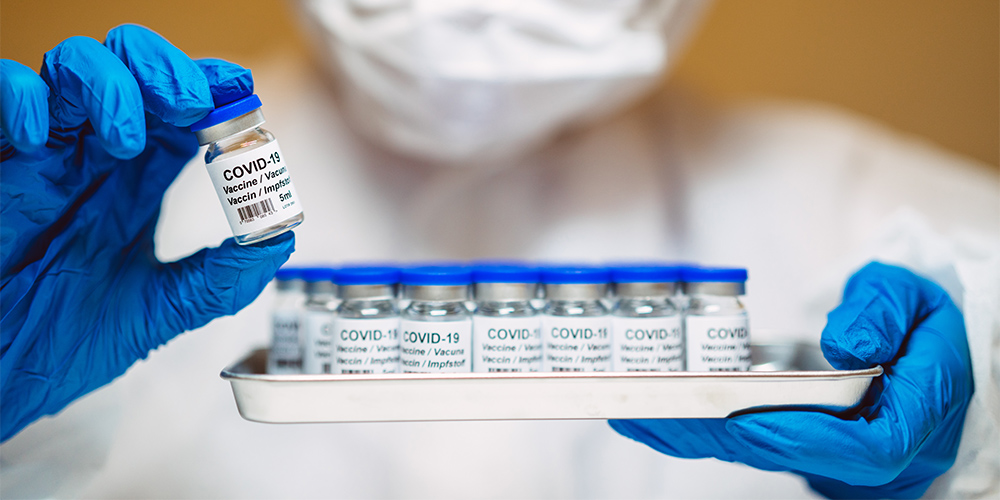Vaccine content page
A Groundbreaking Vaccine Will Need a Groundbreaking Supply Chain
November 12, 2020
By Jason Kelley, General Manager, Blockchain Services
News of the first successfully completed vaccine trial has the potential to bring relief to billions of people around the world. But as encouraging as trials may be, it is extremely important to note that a vaccine cannot be as effective if it is not effectively distributed and trusted by the public.
To their credit, public health experts have already taken great pains to educate the public that there is a potentially long window of time between the completion of a trial and when a vaccine becomes widely available. New vaccines are a rare and remarkable achievement. It took many years after Jonas Salk’s polio vaccine was first discovered in the early 1950s before the disease was fully eradicated, an effort requiring collaboration between both public and private sector actors, including universities, pharmaceutical manufacturers, NGOs like the March of Dimes and the local school districts where the vaccines were mostly distributed.
Of course, distribution systems and networks are obviously more robust today in 2020. But the new COVID-19 vaccines will likely present new challenges of their own, based on complexities of data exchange and required transparency, ones that will require a similar set of public and private partnerships.

Keeping doses cool
A key problem for disseminating mRNA vaccines is they normally need to be kept very cold, roughly 70 degrees below zero, the same temperature used to transport active human tissue.
Temperature aside, the supply chain for vaccines and prescriptions already appears to be complicated. Once produced, a dose must then be transported by a shipper, likely though an airport. If the vaccine is destined for a retailer, it may have yet another stop at a distribution center before it can reach the point of sale. Each player in this supply chain also has middlemen of their own without whom the supply chain would not be possible.
To help identify recalled doses and temperature excursions before they reach patients, distributors need to invest in an “intelligent supply chain” capable of offering a near-real time view into the supply of goods.
As this pandemic has unfortunately often made clear, our current supply chains can come under strain, particularly during times of crisis. To help gain an accurate view of inventory positions and optimize vaccine allocation, stakeholders will need a supply chain that is bolstered by advanced technology like AI to identify early warning signs of disruption from external data, optimize orders based on critical need, and manage inventory reallocation and prioritization. Through IBM Sterling Supply Chain Suite, IBM works with organizations along the supply chain, ranging from production to the point of sale, to assure inventory visibility is maintained, even during unpredictable demand spikes and store closures.

Tracking the last mile
The “last mile” of vaccine distribution will also likely present a unique challenge. As we have seen with the roll-out of COVID-19 testing, point of care will probably take place in a large variety of institutions, from unused schools and community centers to hospitals, satellite clinics and doctors’ offices. This variety means that to maintain a near real-time view of the vaccine supply, officials will need access to a platform that can unite diverse, localized vaccine management strategies in a single integrated view.
Officials will also likely need to be able to maintain and manage multiple dosing, requiring proactive scheduling, planning and demand forecasting across thousands of different locations. Public health officials will need to draw on a diversity of methods to alert and engage with citizens, while also working to provide medical records that may interface with State-owned systems. Personal information and immunization records must also be carefully maintained according to health information laws and regulations.

Mitigating supply chain risks
Finally, all of the incredible work it takes to create a vaccine like this could be undermined by bad actors, counterfeiters and the threat of cyberattacks.
In July, The National Security Agency and the Cybersecurity and Infrastructure Security Agency warned that the pandemic has created additional security risks for the supply chain, from the prevalence of employees working on potentially unsecure servers, to the large variety of vendors with different security standards and vulnerabilities. Without adequate safeguards, hackers could in theory target IoT beacons monitoring vaccine cold chains or use other targeted efforts to undermine distribution or sow chaos. This information and level of threat is not new, however the effects of a global pandemic have brought a new appreciation of the risk and potential impacts.

Moving forward
As the world lights up with hope at signs that something like normalcy may soon return, we must remain vigilant. According to a recent study by Pew Research Center, 77% of citizens surveyed are concerned a vaccine will be approved before its safety and efficacy are fully understood. For COVID-19 to go the way of polio, we will have to do better with public trust and confidence. A whole government approach and public and private sector partnership, drawing on pharmaceutical companies, technology companies, state and local governments, the non-profit sector and more, must come together so that the COVID-19 vaccine is able earn the public’s trust. And for this to happen, manufacturers, distributors, dispensers and citizens must all have some assurance they are working the “comprehensive view of the truth,” a shared and transparent “truth.”
We know that building trusted information exchanges at scale is possible thanks to technologies like hybrid cloud and blockchain. Open hybrid cloud technology allows organizations to work together and share information across a multitude of different computing environments. And once associated with just cryptocurrencies, blockchain is industrialized and in everyday enterprise use helping organizations more securely and transparently share select data with their partners. Taken together, these tools make it possible to bridge platform differences, allowing organizations of all size work together toward a common goal.
Through a recent pilot, IBM worked with organizations at different stage of the pharmaceutical supply chain to demonstrate how data, in a blockchain network, is potentially be used to verify the quality and origins of a product and speed the notification process for a product recall from three days to just a few seconds. With Sonoco, a leading provider of temperature assurance packaging for pharmaceuticals, IBM is also bringing its deep expertise in blockchain to the pharmaceutical industry to help establish a vendor-neutral blockchain platform for use by pharmaceutical manufacturers and carriers.
These networks also help organizations center privacy through permissioned data sharing, helping keep data secured against intrusions and giving users personal control over which organizations have the ability to see what. Through IBM Digital HealthPass, a tool designed to help employers track employee health status and access to public spaces, blockchain makes it possible for employers to help manage their spaces while still giving individuals control over their own personal information.
Only by coming together to create an established record of truth will we be able to work to quickly identify potential threats in the vaccine supply chain, whether it’s due to inclement weather or malicious interference or something else. We must invest with equal focus and commitment that the innovation in our supply chain parallels the incredible innovation of the researchers who are working on the COVID-19 vaccine.
According to IBM Institute for Business Value consumer research, less than 60 percent of citizens we surveyed globally believe the response actions taken by governments in response to the pandemic have been appropriate. The safe, effective and equitable distribution of a vaccine will be a crucial path for governments and leaders to foster public trust. For this to happen, intelligent supply chains will be essential.

Jason Kelley leads IBM’s Global Blockchain Services.